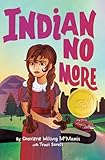Indian no more / by Charlene Willing McManis with Traci Sorell
Material type: TextPublisher: New York : Tu Books, an imprint of Lee & Low Books Inc., [2019]Copyright date: ©2019Edition: First editionDescription: 211 pages : illustrations, map ; 20 cmContent type:
TextPublisher: New York : Tu Books, an imprint of Lee & Low Books Inc., [2019]Copyright date: ©2019Edition: First editionDescription: 211 pages : illustrations, map ; 20 cmContent type: - text
- unmediated
- volume
- 9781620148396
- 1620148390
- 813/.6 23
- PS3613.C58495 I53 2019
- PZ7.1.M363 Ind 2019
- PZ7.1.M46365 Ind 2019
| Item type | Current library | Collection | Shelving location | Call number | Status | Date due | Barcode | Item holds | |
|---|---|---|---|---|---|---|---|---|---|
 J Book
J Book
|
Hoisington Public Library | JFic | J FIC | J FIC McMANIS, CHARLENE WILLING | Available | 37544000666705 |
Regina Petit's family has always been Umpqua, and living on the Grand Ronde reservation is all ten-year-old Regina has ever known. Her biggest worry is that Sasquatch may actually exist out in the forest. But when the federal government signs a bill into law that says Regina's tribe no longer exists, Regina becomes "Indian no more" overnight -- even though she was given a number by the Bureau of Indian Affairs that counted her as Indian, even though she lives with her tribe and practices tribal customs, and even though her ancestors were Indian for countless generations. With no good jobs available in Oregon, Regina's father signs the family up for the Indian Relocation program and moves them to Los Angeles. Regina finds a whole new world in her neighborhood on 58th Place. She's never met kids of other races, and they've never met a real Indian. For the first time in her life, Regina comes face to face with the viciousness of racism, personally and toward her new friends. Meanwhile, her father believes that if he works hard, their family will be treated just like white Americans. But it's not that easy. It's 1957 during the Civil Rights Era. The family struggles without their tribal community and land. At least Regina has her grandmother, Chich, and her stories. At least they are all together. Drawing upon Umpqua author Charlene Willing McManis's own tribal history, Regina must find out: Who is Regina Petit? Is she Indian? Is she American? And will she and her family ever be okay?
There are no comments on this title.

